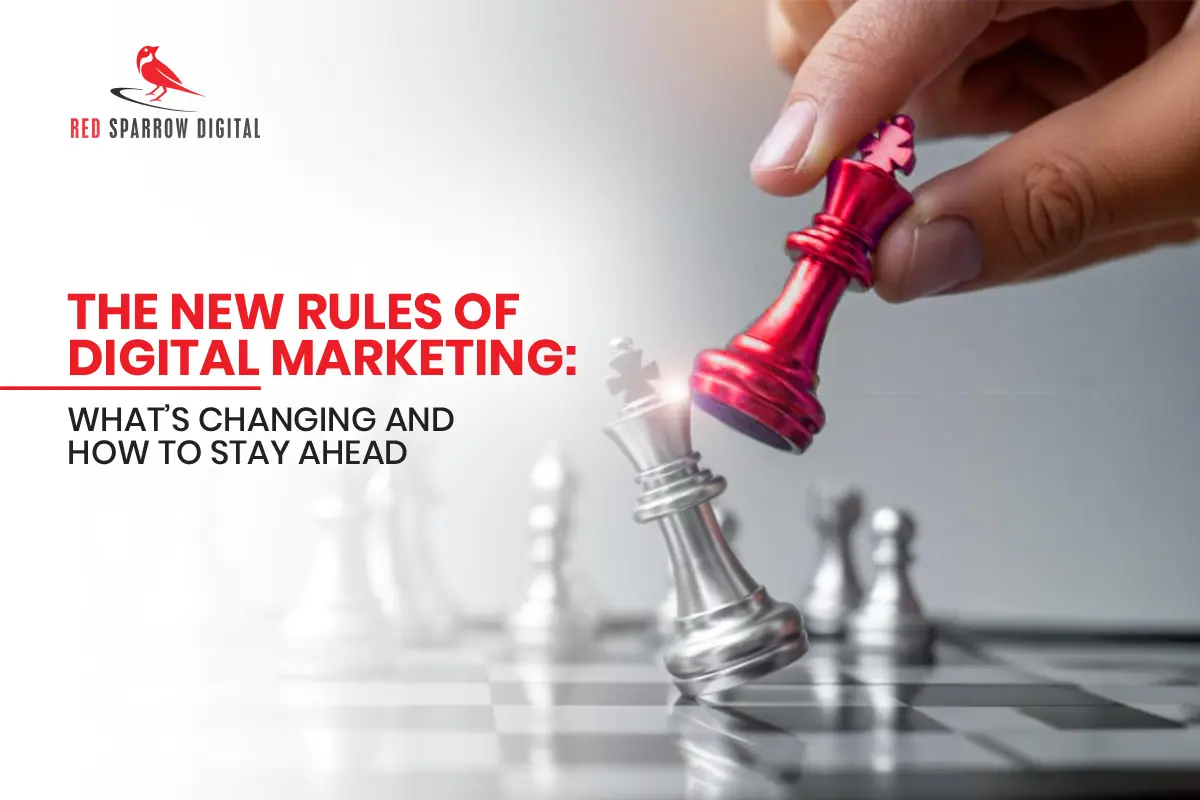
The rules of online marketing are changing every time you blink, it seems. What used to work, even just a couple of years ago, might already be considered outdated in 2025. Algorithms are smarter, the audience’s expectations are higher, and even your website might need a total revamp. But there’s no need to panic. If you’re reading this, know that you’re about to get ahead of the curve.
Let’s take a look at the most significant ways digital marketing is shifting and what you can actually do about it to keep up.
1. Website Structures Are Getting Smarter
Gone are the days of cluttered websites filled with endless text and five different CTAs fighting for attention. Today’s high-performing websites are faster, cleaner, and designed around how people actually use the web.
Mobile-first layouts, fewer clicks, and smarter navigation are where it’s at now. Also, as voice search is becoming more common, sites now need to structure and write content in a way that directly answers questions. That means using natural language, FAQ sections, and schemas that make your content easier for search engines (and voice assistants like Alexa or Google Home) to understand.
If your site still looks like it’s from 2015, it’s high time for an update. Opt for fast load times, logical flow, and content blocks designed for both human eyes and Google bots.
2. SEO Isn’t What It Used to Be
Search engine optimization in 2025 looks a lot different than it did even two years ago. Keyword stuffing is dead. Spammy backlinks are considered deceptive. Content written only to be picked up by the algorithm (without any real substance) gets ignored. Today, Google uses hundreds of indicators to decide what ranks, including user experience, time spent on the site, content freshness, and even the tone of your writing.
And here's the twist: voice search is changing things up. When someone asks their smart speaker a question, Google doesn’t show a list of results. It reads out one answer. If your content isn’t structured to be that answer, you’re invisible.
It goes even further with Gemini, Google’s generative AI. Gemini pulls answers directly from web content to present in its AI summaries at the top of search results. Make sure that your webpage is written clearly, with concise headings, direct answers, and structured formatting (like bullet points, numbered steps, or FAQs). You increase your chances of being the source Gemini selects. Being quoted there increases visibility, trust, and authority, both with users and search engines.
So, start shifting your SEO strategy toward solving problems, and not just ranking keywords. That means writing content that answers specific questions, using formats that Gemini can easily detect, and updating older posts so they stay relevant and visible.
3. Social Media Algorithms Are Harder to Understand
You may have noticed that social media posts don’t reach as many people organically as they used to. Platforms like Instagram, Facebook, and TikTok tweak their algorithms constantly to favor paid content, popular creators, or content that keeps users engaged longer (such as Reels, Shorts, and Lives). This means you now have to work harder to earn attention for your brand, and that requires content that feels personal, relevant, and timely.
What’s changing? Static posts just don’t get results as much anymore. The algorithm wants video, community interaction, and storytelling. You can’t keep flooding the feed with generic content. Your content should be interesting enough to make someone stop scrolling.
4. Influencer Trends Are Evolving
Influencer marketing is still powerful, but the game has changed. Widely-recognized macro-influencers with millions of followers aren’t always delivering the best ROI. Micro and even nano influencers, those with a few thousand engaged followers, are proving more trustworthy and effective.
Consumers are not smart enough to sniff out a fake sponsorship from a mile away. What works now is authenticity. People want to hear from creators who actually use and believe in the product they’re talking about. In other words: Big reach doesn’t mean big results. Always try to collaborate with influencers who understand your niche, your message, and your audience’s needs.
5. AI Is Taking Over (But In a Good Way)
Artificial intelligence isn’t some future concept, it’s here, and it’s changing the marketing game. From analyzing customer data and automating email sequences to writing ad copy and adjusting campaigns in real time, AI is now part of every top-performing strategy. And agencies using AI can deliver faster insights, stronger targeting, and better ROI.
According to data from DesignRush:
- AI-based product recommendations can increase conversions by as much as 20%.
- Dynamic website content powered by AI can lift user engagement by up to 40%.
- Predictive AI in email campaigns has been shown to double engagement and drive higher sales.
If you haven’t started integrating AI tools yet in your marketing, you might be falling behind. Smart marketers are making the most of it to work smarter, not harder.
So How Can You Keep Up?
Digital marketing is shifting fast, but that doesn’t mean you need to stress and overhaul everything overnight. Here are a few smart ways to keep optimizing your strategies:
1. Upskill Regularly
New tools, platforms, and strategies are emerging every month. Even if you’re working with an agency, knowing the basics of what’s new can help you ask smarter questions and make better decisions.
Know that learning how to optimize for voice search or exploring how AI tools can improve your content workflows. Investing time in your own education pays off. But how do you start learning? Start with free tools like Google Skillshop, HubSpot Academy, or Neil Patel’s blogs.
2. Follow Trends, But Don’t Chase Everything
It’s easy to get caught up in the latest trends, but not everything applies to your brand. Instead of jumping on every viral challenge, focus on online platforms where your audience is most active and content formats that actually resonate with them. These trends should be inspiring your strategy, not controlling it. Watch how your competitors adapt, test what works, and don’t be afraid to experiment!
3. Work With Agencies That Get It
Not all marketing agencies are created equal. Some still pitch the same strategies they used five years ago. Others disappear once the invoice is paid. Try to find out the top digital marketing agencies near you. They should be tracking everything, adapting fast, and focusing on real business growth instead of likes and clicks. Look for teams that ask about your goals, share data openly, and talk less about vanity metrics and more about conversions, revenue, and customer lifetime value. Also, if the agency you’re hiring isn’t using AI, omnichannel strategies, or Conversion Rate Optimization (CRO) techniques, you might want to rethink that partnership.
Wrapping Up
At this point, you might be feeling like you're not doing enough to keep up with the changes in digital marketing. But here’s the good news: if you’ve read this far, you’re not standing still. You’re curious, engaged, and already thinking about how to stay ahead.
It doesn’t matter if you’re running a small business, scaling a startup, or managing marketing for a larger brand; remember that there’s always room to improve, learn, and grow. The tools and strategies are out there. The trick is knowing which ones fit you best.
The future of digital marketing isn’t about being perfect. It’s about being adaptable. So keep learning, stay curious, and never stop adjusting. You’re already on the right path.



